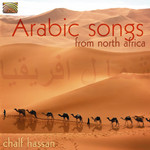
Arabic Songs from North Africa
 $25.00
Out of Stock
$25.00
Out of Stock6+ weeks add to cart more by this artist
Chalf Hassan
Arabic Songs from North Africa
[ Arc / CD ]
Release Date: Tuesday 11 April 2006
This item is currently out of stock. It may take 6 or more weeks to obtain from when you place your order as this is a specialist product.
Arabic call-and-response singing, driven by infectious and rousing rhythms, oud, violins, lots of percussion and intricate syncopated clapping - an exciting album of traditional Moroccan music.
Hassan performs his music, based on traditional Moroccan folk and classical songs in a distinctly personal style Today he is known for his technique, vibrant performance as well as his outstanding teaching skills. He displays a unique musical sensitivity and ability to improvise and embellish the patterns familiar to Arabic music.
Chalf Hassan
Hassan was born in Agadir (Morocco) into a religious family, steeped in Koranic culture. He began playing the darbouka (Egyptian tabla), guitar and oud (lute) at the age of ten and he started playing professionally at the age of nineteen. He toured throughout Europe with Arab, Western, and African musicians for years before crossing cultural barriers to create his Arab-Spanish fusion. Hassan accompanied several bands and singers on tours where he played with some of the most outstanding flamenco dancers and musicians in Sydney. Since then he has been regularly involved in flamenco performances in Sydney and other Australian cities.
Hassan was invited by Hossam Ramzy to join the 'Egyptian Ensemble' accompanying Robert Plant and Jimmy Page (ex Led Zeppelin) on the South America / Japan / Australia leg of their 1996 World Tour and on their album 'No Quarter - Unledded'. He also contributed to recordings with Hossam Ramzy, Phil Thornton, Tunji Beier and others.
Chalf Hassan describes his repertoire as conservative although his delivery is light-hearted and dynamic, with compositions covering themes such as love, piety and spirituality. His music integrates elements from many folk traditions including Chaabi, Oriental and Spanish music.
[Note: Chaabi is Arabic for 'popular'. It is a Moroccan pop music, drawing from Moroccan folk music and other Arab and western musical styles. Chaabi was originally performed in markets, but today is found at any celebration or meeting. Chaabi songs typically end with a swift rhythmic section accompanied by syncopated clapping.]
Tracks:
1. Amul Koutchi (trad.) - 5:43
2. El-alim Yal-alim (trad.) - 10:45
3. Alabas Alabas (trad.) - 7:52
4. Lalla Fatima (trad.) - 4:36
5. Dada Hiyani Dada (trad.) - 8:41
6. Lahssab, Talata We-talatin (trad.) - 5:37
7. Tzawaj Magalhalia (trad.) - 4:33